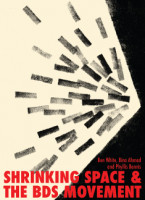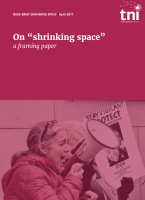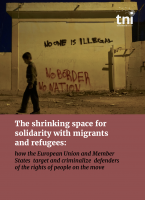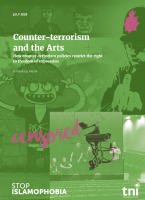Solidarity under Siege Germany’s repression of the Palestine Movement
Regions
Since 7 October 2023, Germany’s unabating support for Israel’s genocide in Gaza is mirrored by a sweeping crackdown on Palestine solidarity at home. This ranges from protest bans and police violence, to lawfare, smear campaigns, cultural de-platforming, workplace reprisals, and the instrumentalisation of migration and asylum law. The state has been aided by most of the media and even parts of the NGO system and the political left. Together, these measures illustrate the emergence of a repressive infrastructure in Germany, based on the intentional conflation of antisemitism and anti-Zionism, which criminalises almost any effective form of solidarity with Palestine and threatens broader civil liberties.

Downloads
Authors
Report Summary
Since 7 October 2023, German authorities have imposed a far-reaching domestic crackdown on Palestine solidarity throughout the state in tandem with the political, diplomatic and material backing for Israel’s genocide in Gaza. This ranges from protest bans and police violence, to smear campaigns, cultural de- platforming, workplace reprisals, and the instrumentalisation of migration and asylum law. Together, these measures illustrate the emergence of a repressive infrastructure in Germany which criminalises almost any effective form of solidarity with Palestine and threatens broader civil liberties.
The report covers the first 18 months of the genocide, from 7 October 2023 until mid-April 2025. It synthesises interviews with activists, legal and political analysis and case evidence across four pillars of repression that map onto the report’s structure:
- Germany’s complicity in Israel’s illegal occupation of Palestine and its genocide in Gaza;
- the legal-political architecture that deliberately conflates anti-Zionism with antisemitism;
- policing, violence, censorship and economic pressure against activists and critical voices; and
- the role of media, non-government organisations (NGOs) and parts of the political left in enabling this climate.
The report finds that since October 2023 Aimé Césaire’s ‘boomerang’ is coming back in full force from the colony to the metropole. Germany’s support for Israel’s apartheid regime and war crimes, crimes against humanity and genocide in Gaza, and attacks on other states has translated into repressive policies, mass surveillance, police brutality, and a shrinking space for free expression at home. Germany is not merely absorbing this violence, but is refining, institutionalising, and exporting it. The country has become a laboratory for the criminalisation of solidarity with Palestine, testing how far it can go in suppressing free speech, banning protest, and bending the constitutional framework until it is almost unrecognisable.
Central to the repression of the Palestinian solidarity movement is the deliberate conflation of antisemitism and anti-Zionism. Germany’s historic responsibility for the Holocaust is routinely used to justify another genocide and the repression of those who try to stop it. Critics of Israel, many of whom are Jewish, are labelled as antisemitic and Palestinians who mourn their dead and demand justice are cast as a threat to public order.
This crackdown is not enforced by state power alone. Media outlets play a direct role in manufacturing consent by consistently justifying the genocide in Gaza as ‘Israel’s right to self-defence’ and the violence inflicted upon Palestinians in Gaza and increasingly the West Bank. Domestically, they have uncritically echoed official German and Israeli state political and police narratives, dismissing or even inciting violence against the solidarity movement and ignoring the rapidly shrinking space for dissent. Many civil society actors have effectively self-policed their members, disinvited Palestinian speakers, cancelled events, and remained silent in the face of repression. Even sectors of the German left and social movements, fearing reputational damage or funding cuts, have failed to resist Germany’s authoritarian shift. Worse, in many cases they have actively enabled it.
The crackdown has not only targeted movements in support of Palestine but has also served to test a broader transformation towards authoritarianism. A defining feature is the conflation with migration policy. Under the pretext of combating antisemitism and extremism and in a general climate of increasingly inhumane, harmful and at times deadly migration policies, immigration law has also become a tool of political control. The state has refused visas, carried out deportations or blocked people’s naturalisation because of social media posts or attending protests, acts which are protected under international human rights law. Residency status, citizenship, and asylum rights are now contingent on ideological conformity. While state actors continue to single out rising antisemitism, other forms of racism, particularly Islamophobia, have surged, with people paying for this with their health and lives.
The crackdown is not occurring in a vacuum. It is part of a broader shift towards the hard-right and the securitisation and militarisation of various domains in German and in global politics. What we are witnessing is not only complicity in a genocide, but an attempt to remilitarise German society, to redefine dissent as extremism, and to equate liberation movements with Nazism. Measures tested on the Palestinian solidarity movement may well be extended to other dissenting groups, from environmentalists to anti-militarists.
The consequences are of course also deeply personal. For many Palestinian, Arab, Muslim and anti-Zionist Jewish residents in Germany, daily life has become a climate of violence and fear, as highlighted in the interviews with activists. Even so, people are resisting. While the media echo state narratives, ever more people are seeing through these. Protests continue, even in the face of police violence. Palestinian voices remain defiant.





